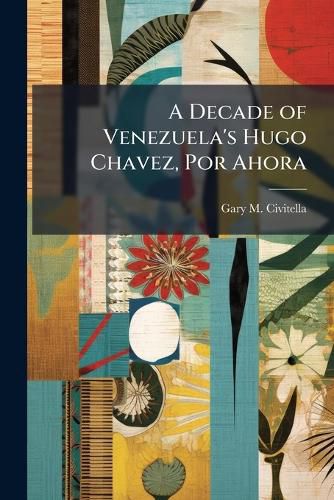Readings Newsletter
Become a Readings Member to make your shopping experience even easier.
Sign in or sign up for free!
You’re not far away from qualifying for FREE standard shipping within Australia
You’ve qualified for FREE standard shipping within Australia
The cart is loading…






This research paper uses an expository methodology to examine the last ten years of Venezuela's Hugo Chavez presidency and the significant aspects in terms of US security. The paper contents highlight some of Chavez's notable changes, impacts on relations with the United States (US) and offers some suggestions for future strategies. The research focused on trying to understand Chavez's background, intentions and relevance through a relatively neutral lens. Despite President Hugo Chavez's anti-American rhetoric, the US has withstood the last ten years without significant security issues or real threats resulting from this ongoing tension. An analysis of Chavez's presidency reveals that Venezuela poses an ongoing challenge that warrants close attention but does not constitute a significant security threat to the United States. This paper addresses the significant aspects of Chavez and the US/Venezuela relationship up to this point in time (March 2009.) The majority of research reflects back over the past decade since December 1998.
This work has been selected by scholars as being culturally important, and is part of the knowledge base of civilization as we know it. This work was reproduced from the original artifact, and remains as true to the original work as possible. Therefore, you will see the original copyright references, library stamps (as most of these works have been housed in our most important libraries around the world), and other notations in the work.
This work is in the public domain in the United States of America, and possibly other nations. Within the United States, you may freely copy and distribute this work, as no entity (individual or corporate) has a copyright on the body of the work.
As a reproduction of a historical artifact, this work may contain missing or blurred pages, poor pictures, errant marks, etc. Scholars believe, and we concur, that this work is important enough to be preserved, reproduced, and made generally available to the public. We appreciate your support of the preservation process, and thank you for being an important part of keeping this knowledge alive and relevant.
$9.00 standard shipping within Australia
FREE standard shipping within Australia for orders over $100.00
Express & International shipping calculated at checkout
This research paper uses an expository methodology to examine the last ten years of Venezuela's Hugo Chavez presidency and the significant aspects in terms of US security. The paper contents highlight some of Chavez's notable changes, impacts on relations with the United States (US) and offers some suggestions for future strategies. The research focused on trying to understand Chavez's background, intentions and relevance through a relatively neutral lens. Despite President Hugo Chavez's anti-American rhetoric, the US has withstood the last ten years without significant security issues or real threats resulting from this ongoing tension. An analysis of Chavez's presidency reveals that Venezuela poses an ongoing challenge that warrants close attention but does not constitute a significant security threat to the United States. This paper addresses the significant aspects of Chavez and the US/Venezuela relationship up to this point in time (March 2009.) The majority of research reflects back over the past decade since December 1998.
This work has been selected by scholars as being culturally important, and is part of the knowledge base of civilization as we know it. This work was reproduced from the original artifact, and remains as true to the original work as possible. Therefore, you will see the original copyright references, library stamps (as most of these works have been housed in our most important libraries around the world), and other notations in the work.
This work is in the public domain in the United States of America, and possibly other nations. Within the United States, you may freely copy and distribute this work, as no entity (individual or corporate) has a copyright on the body of the work.
As a reproduction of a historical artifact, this work may contain missing or blurred pages, poor pictures, errant marks, etc. Scholars believe, and we concur, that this work is important enough to be preserved, reproduced, and made generally available to the public. We appreciate your support of the preservation process, and thank you for being an important part of keeping this knowledge alive and relevant.